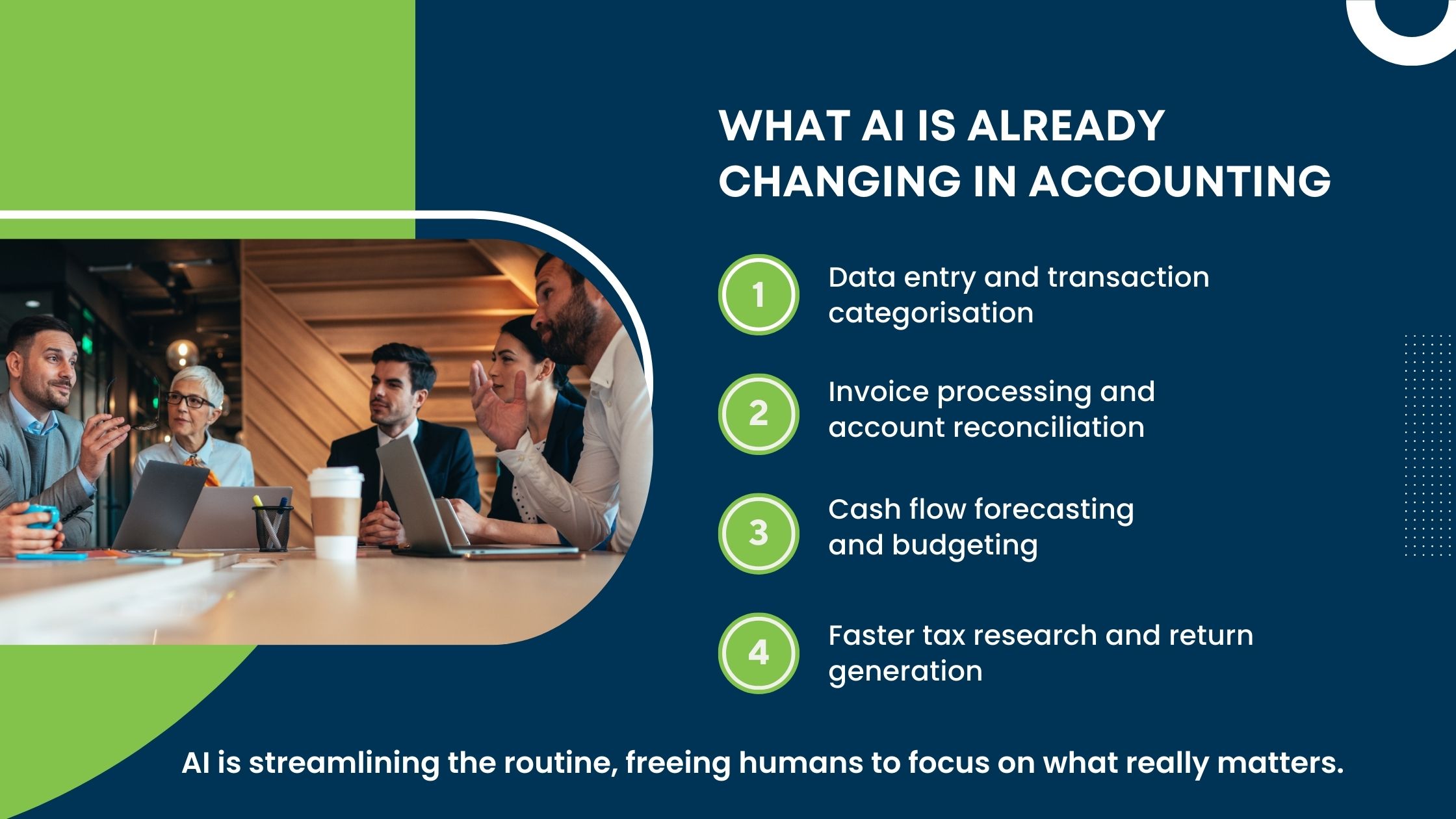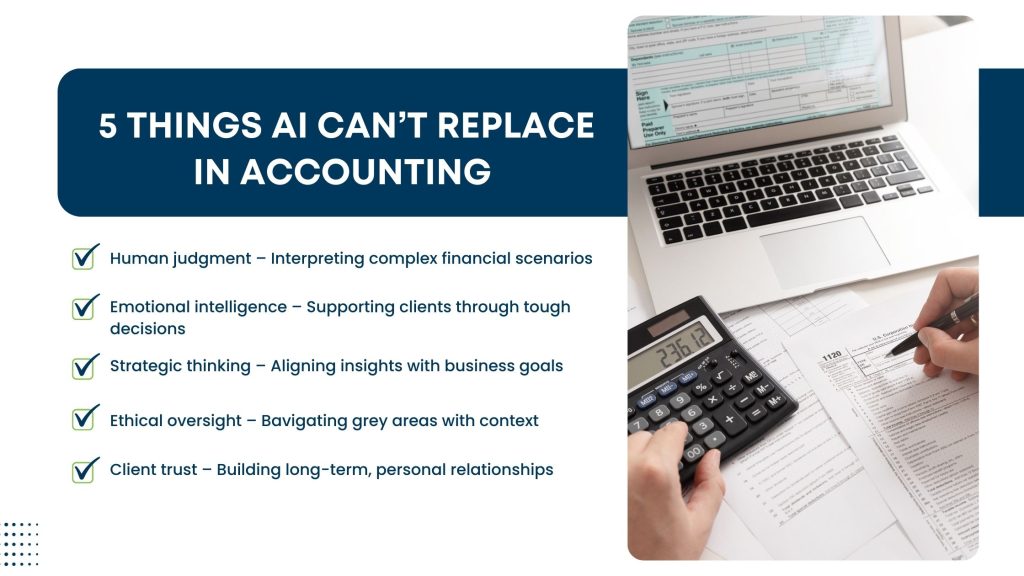- July 11, 2025
- by NCS Global
- 4mins read
The rise of artificial intelligence (AI) has sparked one of the most urgent conversations in the finance world: Will AI replace bookkeepers and accountants in 2025? The short answer is no, but the profession is evolving faster than ever. AI is transforming traditional workflows by automating repetitive, time-consuming tasks like data entry, reconciliations, and invoice processing. The result? Accounting firms can deliver faster, more consistent, and more insightful services.
But AI is not a replacement. It’s a tool. Those who treat AI as an opportunity to elevate their skills and services will thrive. Those who resist it may find themselves lagging behind more agile, tech-enabled competitors.
AI in Accounting: Adoption Is Accelerating
Artificial intelligence is no longer a future concept—it’s here and expanding quickly. According to the 2025 Generative AI in Professional Services Report by Thomson Reuters:
- 21% of tax and audit firms are already using AI tools, up from just 8% in 2024.
- 25% of tax firms plan to adopt generative AI within the next year.
- Over 52% of accounting staff use tools like ChatGPT for tasks such as tax research, document summarisation, and bookkeeping support.
These shifts show that AI is reshaping the profession from the inside out. But even with this rapid growth, many professionals still ask: Will CPAs be replaced by AI? How will AI affect accounting jobs?
The reality is: AI can process data, but it can’t replace professional judgment, client relationships, or contextual thinking.
AI’s Real Impact on Accounting in 2025
AI is rapidly transforming the accounting profession. In 2025, 21% of tax and audit firms reported using generative AI, up from just 8% in 2024, the largest increase across professional sectors. This surge signals a growing investment in smarter, faster workflows.
Meanwhile, over 52% of accounting staff use tools like ChatGPT for tasks such as tax research, return prep, bookkeeping, and summarising documents. These applications demonstrate how AI is already automating key elements of accounting, improving speed, accuracy, and capacity, while allowing professionals to shift toward high-value advisory roles.
Is AI Good Enough to Replace Bookkeepers and Accountants in 2025?
No. AI enhances accounting but can’t fully replace human professionals, yet.
What AI Does Well:
- Handles routine processes such as data entry, invoice reconciliation, and transaction classification.
- Analyses large datasets to spot patterns and anomalies
- Boosts efficiency through workflow automation tools
Where AI Falls Short:
- Struggles with interpreting complex tax laws or unclear entries
- Relies on clean, accurate data, errors still need human correction
- Can’t build trust or offer personalised financial advice
The Bottom Line:
Will AI replace accountants or bookkeepers in 2025? No. It’s a powerful tool, not a substitute. The profession still relies on human judgment, strategy, and client relationships.

Will AI Replace Accountants and Bookkeepers in the Next 5 Years?
Despite rapid progress, there’s no evidence that AI will replace bookkeepers or accountants within the next five years. Here’s why:
What AI Can Do Today:
- Automates repetitive tasks like invoice processing, account reconciliation, and financial reporting
- Improves accuracy in routine bookkeeping
- Supports high-volume data analysis through AI-powered accounting software
Why Human Professionals Are Still Essential:
- AI struggles with strategic planning and interpreting nuanced scenarios
- It depends on structured, error-free data
- It lacks the contextual judgment required for customised financial advice
- Trust, ethics, and emotional intelligence remain uniquely human
The bottom line: Will accounting be automated? Yes, to an extent, but automation is not the same as replacement.
What AI Is Really Doing in Accounting
So, what’s actually being automated today?
Tasks AI Handles Well:
- Data entry and transaction categorisation
- Invoice matching and bank reconciliations
- Cash flow forecasts and basic financial reports
These tools fall under Robotic Process Automation (RPA) and agentic AI, software systems that can carry out defined, rule-based processes or even take limited autonomous action.

But Here’s What AI Can’t Replace:
- Interpreting complex tax legislation or ambiguous transactions
- Designing custom tax strategies based on long-term business goals
- Navigating high-stakes scenarios like audits, mergers, or acquisitions
- Building trust and rapport with clients, especially during volatile times
- Applying ethical judgment in grey areas
What Accountants and Bookkeepers Need to Stay Competitive
To remain future-ready, professionals should consider upskilling in:
Data literacy – understanding how to read and validate machine-generated outputs
AI tool proficiency – learning how to use platforms like Fathom, ChatGPT, or Dext effectively
Client advisory skills – shifting from transactional tasks to strategic conversations
Ethics and compliance – staying current with how AI intersects with local tax laws and professional standards
This is where the future of AI in accounting and finance lies: augmenting human intelligence, not replacing it.
Can AI Replace Accountants by 2030?
Some industry reports suggest a higher degree of automation by 2030. However, the idea that AI will fully replace accountants within the next five years is highly unlikely, and unsupported by current technology or regulation.
What’s more likely? The emergence of AI-augmented accountants professionals who lead with insight, guided by real-time data from smart systems.
Conclusion: The Future Is Human-Led, AI-Enhanced
So, will AI replace accountants or bookkeepers by 2025? The answer is no. While the future of AI in accounting and finance includes increased automation, the profession is far from obsolete. AI is helping bookkeepers and accountants become more productive, not redundant.
As technology continues to evolve, those working in accounting, bookkeeping, and tax preparation will need to adapt their workflows and skill sets to stay ahead. And while the question of whether AI can replace accountants by 2030 remains, it’s clear that those who embrace technology and evolve will lead the future. The human element, judgment, strategy, empathy, will always be essential in accounting.






